Sketch of Public Policy Communion, August 2019
|
2019年8月份國政聯誼會縮影 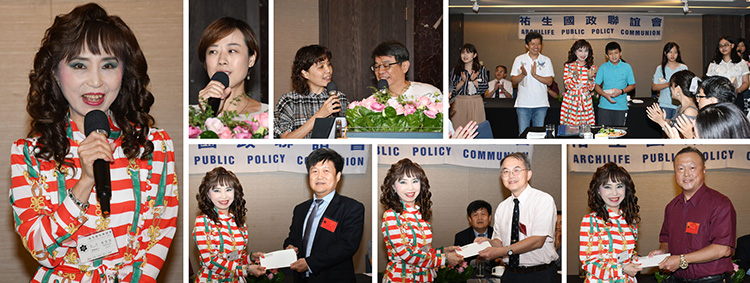 本會於2019年8月25日假台北喜來登大飯店地下二樓喜廳舉行「祐生國政聯誼會」。在主持人黃晉英秘書長宣布後揭開當日活動序幕,在輕鬆、活潑的節目過後,隨即由主持人帶來重要訊息:「亞馬遜雨林出現近年來最嚴重的森林大火,已延燒大約三週之久,由此可知外在環境不斷在改變,我們應隨時警惕自己,注意自身安危,做事情要量力而為。另外,祐生將於9月3日正式遷址「長‧安樓」,除了將規劃新型態的讀書會與聯誼會,也將以三年的時間轉折,交棒給新世代承接,帶領祐生持續向前。而新型態「讀書會2.0」將於9月10日正式召開,與會者在會中可發表心得感想,期望能促進更多交流,邁向由專智到通智到眾智的目標。為導引大家持續關注氣候變化對生存環境的影響,本月份續進行「祐生謎‧猜」,題目為:「今年的冬天會是怎樣的樣貌?」提供四個選項:「1.暖冬 2.度日如年 3.根本沒有冬天 4.以上皆非」,請各位一同關心氣候異變課題。」 The August Archilife Public Policy Communion of 2019 was held on August 25, 2019. After a series of relaxing and fun activities, Secretary General Huang Chin-ying made the following announcement, "The most devastating forest fire in recent years took place in the Amazon rain forest, burning for about three weeks. It is apparent that with the constantly changing external environment, we should be alert at all times, pay attention to our own safety and act according to our own ability. Additionally, Archilife Research Foundation will officially relocate to "Chang‧An Building" on September 3rd. In addition to planning a new form of Bookish Assembly and gathering, it will hand over to the new generation every three years to lead Arhcilife to continue moving forward. The new form of "Bookish Assembly 2.0" will be officially held on September 10th. On the site, participants can express their comments, hoping to promote more exchanges, moving towards the goal from specialization, general knowledge, to gollective wisdom. In order to lead everyone to continue to focus on the effects of climate change on the living environment, the "Archilife Riddle Guess" will continue to be carried out. With "What will this winter appear to be?" as the theme, four choices are provided: "1. Warm winter; 2. Days wear on like years; 3. There is no winter at all; 4. None of the above". Everyone is requested to show concern towards the issue of climate change." 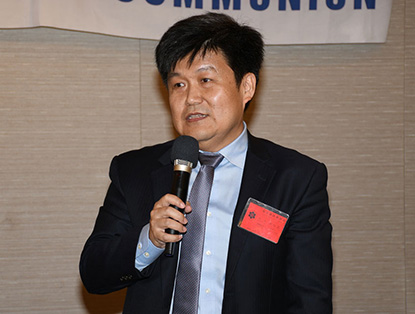 緊接著進行專題演講,由國政會委員林裕益先生主講「高雄市國土計畫之推動」。主講人首先表示全國國土計畫未來將以功能區分,包括國土保育地區、海洋地區、農業發展地區及城鄉發展地區。立法目的為因應氣候變遷,確保國土安全,保育自然環境與人文資產,促進資源與產業合理配置,達到強化國土整合管理機制。主講人接著闡述高雄市國土計畫整體空間發展構想為:一核雙心三軸四區。辦理的重點為維護農地總量及產業發展,辦理重大建設計畫地區,未登記工廠處理,原住民聚落及鄉村地區規劃,國土功能分區劃設。目前也舉辦了許多公聽會,以建立民眾參與及補償機制。 緊接著進行專題演講,由國政會委員林裕益先生主講「高雄市國土計畫之推動」。主講人首先表示全國國土計畫未來將以功能區分,包括國土保育地區、海洋地區、農業發展地區及城鄉發展地區。立法目的為因應氣候變遷,確保國土安全,保育自然環境與人文資產,促進資源與產業合理配置,達到強化國土整合管理機制。主講人接著闡述高雄市國土計畫整體空間發展構想為:一核雙心三軸四區。辦理的重點為維護農地總量及產業發展,辦理重大建設計畫地區,未登記工廠處理,原住民聚落及鄉村地區規劃,國土功能分區劃設。目前也舉辦了許多公聽會,以建立民眾參與及補償機制。Next on the schedule was the keynote speech. First, Mr. Lin Yu-yi spoke on "Kaohsiung City’s National Land Planning Promotion". The presenter first said that the national land planning will be divided by function, including national land conservation areas, marine areas, agricultural development areas, and urban and rural development areas. The objective of the legislation is to ensure national land security in response to climate change, conserve the natural environment and cultural assets, and promote the reasonable distribution of resources and industries, thereby strengthening the national land integration and management mechanism. The presenter then elaborated on Kaohsiung City’s national land planning overall spatial development concept of "one core, two hearts, three axes, four regions." The conduction focus lies in maintaining the total output of agricultural lands, handling of major infrastructure planning areas, the disposal of unregistered factories, indigenous village and rural area planning, and national land function zoning. At present, many public hearing sessions have been held to establish public participation and compensation mechanisms. 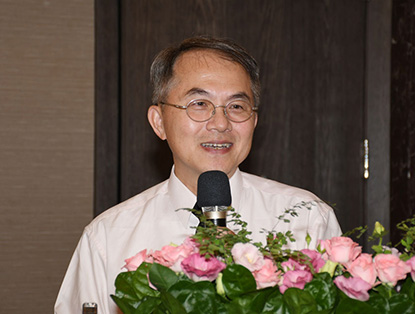 接著由國政會委員張震鐘先生主講「文資價值優先的概念」。主講人首先表示我國自1982年5月26日《文化資產保存法》正式實施,2016年7月12日修法大幅修改了文資法》的內容,增加了獎勵也大幅提高了罰則。主講人接著說明價值優先是世界各國對於文化資產保存目標的基本共識。為利文化資產再利用,有關其建築管理、土地使用及消防安全等事項,不受既有法規之限制。營建工程或其他開發行為進行中,古蹟、歷史建築等,應即停止工程或開發行為之進行。主講人也舉出台電金瓜石亮點計畫、三貂嶺至牡丹隧道再生、板橋迪毅堂等工程為例,讓與會者更為了解。 接著由國政會委員張震鐘先生主講「文資價值優先的概念」。主講人首先表示我國自1982年5月26日《文化資產保存法》正式實施,2016年7月12日修法大幅修改了文資法》的內容,增加了獎勵也大幅提高了罰則。主講人接著說明價值優先是世界各國對於文化資產保存目標的基本共識。為利文化資產再利用,有關其建築管理、土地使用及消防安全等事項,不受既有法規之限制。營建工程或其他開發行為進行中,古蹟、歷史建築等,應即停止工程或開發行為之進行。主講人也舉出台電金瓜石亮點計畫、三貂嶺至牡丹隧道再生、板橋迪毅堂等工程為例,讓與會者更為了解。Next, Mr. Chang Chen-chung spoke on "The Concept of Cultural Asset Value Prioritization". The presenter first said that Taiwan officially implemented the Cultural Heritage Preservation Act on May 26, 1982 and substantively revised the content of the said act on July 12, 2016, adding incentives as well as substantially increasing penalties. The presenter went on to explain the value prioritization referred to a basic consensus reached by countries around the world regarding cultural asset preservation goals. In order to facilitate cultural asset reutilization, building management, land use, and fire safety-related matters are not bound by existing regulatory limitations. Ongoing construction projects or other development practices, including monuments, historical buildings, and so on should be terminated at once. The presenter also cited Taiwan Power Company’s Jinguashi Highlights Plan, the Sandiaoling-Mudan Tunnel Regeneration, the Banqiao Diyi Shrine Project, etc. as examples to give participants better insights. 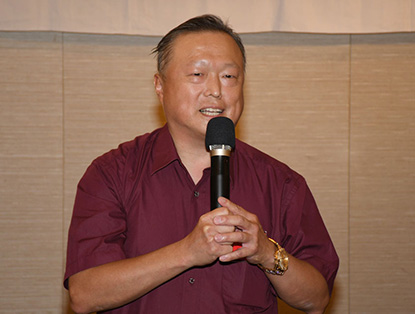 接著由國政會委員姚維正先生主講「基因科技與提升健康識能」。主講人首先提到健康識能是有關個人與健康資訊互動的能力,能夠批判性分析、運用資訊,從不同溝通管道中擷取資訊了解意義,以及充足的讀寫技能。主講人接著提到國外學者表示基因科技為對抗氣候異變的關鍵,而黑猩猩比人類多了一對染色體,是否就代表比人類優秀?基因編輯工程可以創造新超級生物,但這樣的作法是希望還是毀滅並無定論。希望更多的民眾更了解基因科技的進展和增進人類福祉的機會,並且不被濫用。 接著由國政會委員姚維正先生主講「基因科技與提升健康識能」。主講人首先提到健康識能是有關個人與健康資訊互動的能力,能夠批判性分析、運用資訊,從不同溝通管道中擷取資訊了解意義,以及充足的讀寫技能。主講人接著提到國外學者表示基因科技為對抗氣候異變的關鍵,而黑猩猩比人類多了一對染色體,是否就代表比人類優秀?基因編輯工程可以創造新超級生物,但這樣的作法是希望還是毀滅並無定論。希望更多的民眾更了解基因科技的進展和增進人類福祉的機會,並且不被濫用。Next, Mr. Yao Wei-cheng spoke on "Genetic Technology and Health Knowledge Improvement". The presenter first mentioned health knowledge refers to an individual’s ability to interact with health information, able to engage in critical analysis and use information, extract information from various communication channels to understand the significance and possess adequate reading and writing skills. The presenter then mentioned how foreign scholars said genetic technology is the key to fight against climate change. Chimpanzees have an additional pair of chromosomes compared to humans, but does it mean they are more outstanding than humans? Genetic engineering helps create super organisms, but whether or not this practice leads to hope or destruction remains to be seen. Finally, we hope that the general public can better understand the progress of genetic technology to have an opportunity to improve human wellbeing rather than abusing it. 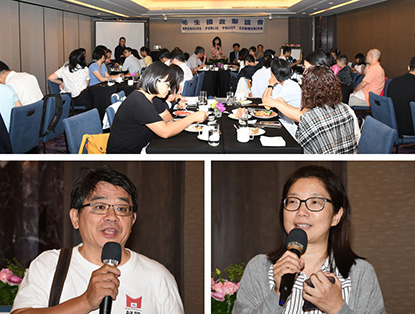 演講完畢,黃晉英秘書長代表基金會致贈謝禮予主講人。接著在與會者紛紛利用「餵豬時間」提出個人意見與看法互相交流後,圓滿地結束八月份國政聯誼會。 演講完畢,黃晉英秘書長代表基金會致贈謝禮予主講人。接著在與會者紛紛利用「餵豬時間」提出個人意見與看法互相交流後,圓滿地結束八月份國政聯誼會。After the speech, Secretary General Huang Chin-ying presented a gift to the speakers on behalf of the foundation. Then, attendees expressed and exchanged their opinions and views during the piggy hour. The August Archilife Public Policy Communion ended smoothly. |

